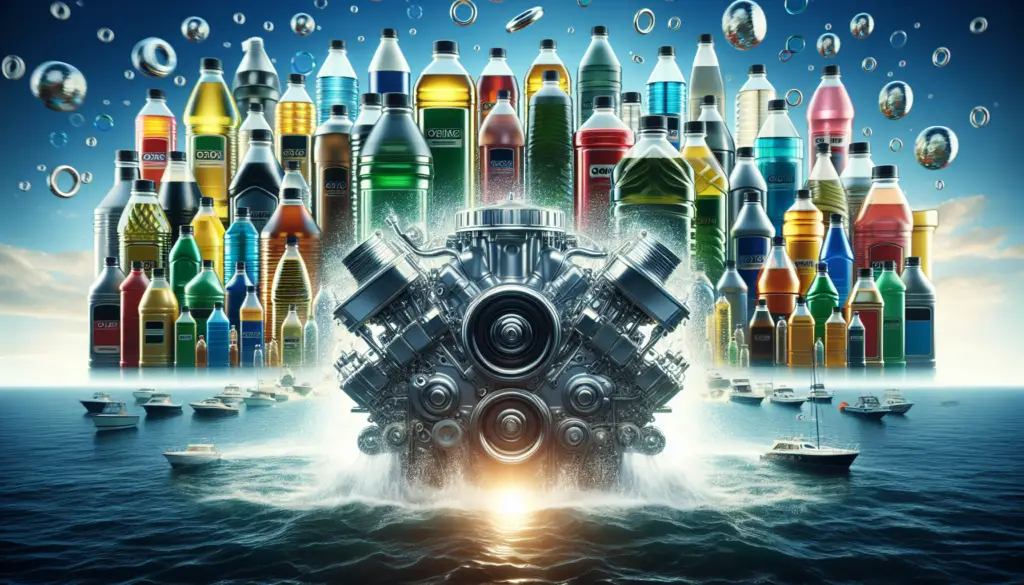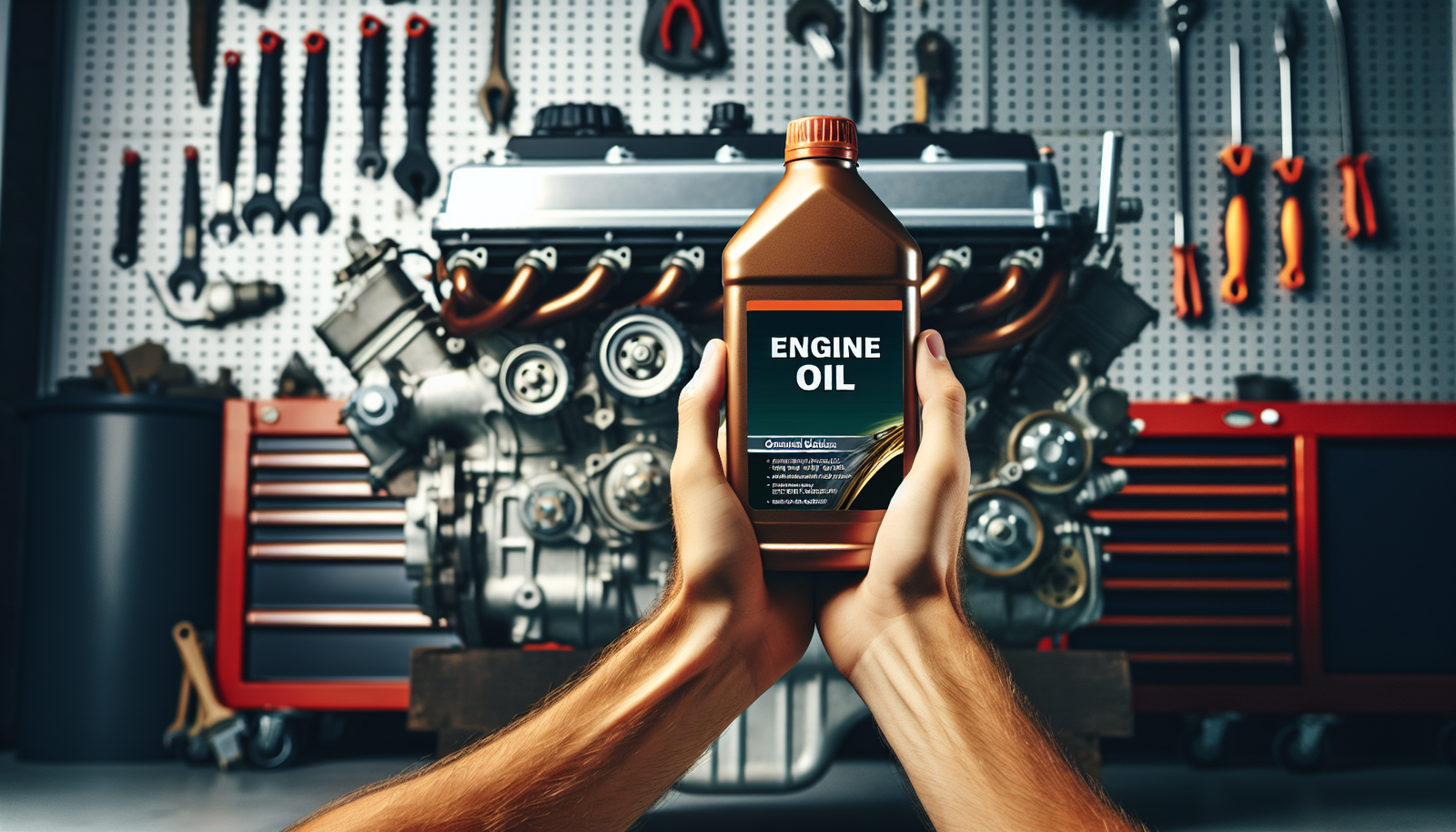Imagine gearing up for a sunny day out on the water, only to have your boating adventure cut short due to engine failure. It’s not bad luck, but a likely result of using the wrong engine oil. Yet, you can avoid this frustrating scenario by making an informed decision on the right boat engine oil for your engine. The article “How To Choose The Right Boat Engine Oil For Optimal Performance” offers a comprehensive guide to navigate you through the world of marine engine oils, unraveling the mystery behind oil types, viscosities, and additives so you can ensure your boat runs smoothly and efficiently, every time.
Understanding The Importance of The Right Boat Engine Oil
Just like blood in a human body, that’s what the engine oil is to your boat engine. It plays a crucial role in making sure everything runs smoothly.
Appreciating the role of engine oil
You may be wondering: why is engine oil so important? The answer is pretty simple. It acts as a lubricant for all the moving parts of the engine, reducing friction, wear, and the accumulation of heat. Moreover, oil absorbs and carries away dirt and other particles, thus protecting the inner parts of the engine from grime and corrosion.
Impact of engine oil on performance
The right engine oil makes a tremendous difference in how your boat performs. Talk about a smoother and more efficient ride! The engine oil facilitates the efficient working of the engine, leading to improved fuel economy and power. In essence, the type of engine oil you use significantly affects your overall boating experience.
Long-term effects of using the wrong oil
Using the wrong engine oil can be harmful in the long run. It can lead to increased wear, a build-up of sludge, and reduced engine performance. Worse still, in some cases, it may even result in severe engine damage. So, it’s not just about choosing any engine oil; it’s about choosing the right one.
Different Types of Boat Engines
Before delving into the types of engine oils, let’s take a look at the different types of boat engines that utilize these oils.
Inboard engines
Inboard engines are built inside the boat’s hull hence their name. They are often used in larger yachts and vessels due to their robust power and high capacity.
Outboard engines
On the flip side, outboard engines are located on the exterior of the boat. You’ll typically find these engines in small canoe-type boats, pontoons, and fishing boats. They are loved for their portability and ease of repair.
Stern drive engines
Stern drive engines, also known as inboard/outboard engines, offer the best of both worlds. They have the power and reliability of the inboard designs but with the maneuverability of outboard engines.
Jet propulsion engines
Then there are the jet propulsion engines. These engines suck in water from underneath the boat and spit it out the back, creating a jet propulsion that propels the boat forward.

Categories of Boat Engine Oils
When it comes to engine oils, you’ll find several options on the market, categorized into four main types.
Mineral-based oils
Mineral oils are conventional oils derived directly from crude oil. They are relatively affordable but need to be changed more frequently than synthetic oils.
Synthetic oils
Synthetic oils are engineered in labs, providing superior lubrication and protection for the engine. They are a bit pricier but typically extend longer drain intervals and better engine performance.
Semi-synthetic oils
Semi-synthetic oils are a blend of mineral and synthetic oils, providing a balance between cost and performance.
Bio-based synthetic oils
The eco-friendly option among the bunch, bio-based synthetic oils, are derived from renewable sources, making them a more sustainable choice for environmentally conscious boaters.
Choosing Oil Based on Boat Engine Type
Now that you understand the different types of oils and engines let’s match them. The type of oil you need is largely dependent on the type of engine you have.
Oil for inboard engines
For inboard engines, due to their high loads and operating temperatures, synthetic or semi-synthetic oil is typically preferred. These oils can handle the heat and provide excellent lubrication.
Oil for outboard engines
Outboard engines normally operate in harsh conditions and require specific additives to protect against corrosion. Synthetic oil is recommended due to its superior protection and performance.
Oil for stern drive engines
Likewise, stern drive engines can operate under high pressure and temperatures needing a resilient synthetic oil.
Oil for jet propulsion engines
Jet propulsion engines have a unique operating mechanism, requiring a specific type of oil, often specified by the manufacturer.

Factors To Consider When Choosing Boat Engine Oil
When choosing your boat engine oil, there are several factors to consider including:
Financial budget
How much are you willing to spend? Synthetic oils, while superior, are pricier than mineral oils.
Operational environment
Will your boat be operating in cold or warm waters? In salty or fresh waters? Different oils perform differently in diverse marine environments.
Frequency of use
How often do you use your boat? More frequent usage may require an oil that preserves its qualities over a longer time.
Personal preferences
In the end, you have to make a choice that suits your situation. Some people stick with the oil brand the manufacturer recommends, while others do their research and go for the best value.
Advantages Of Synthetic Oils Over Conventional Oils
There are several advantages of using synthetic oils over conventional ones.
Greater protection
Synthetic oils provide superior protection for your engine against wear, heat, and grime.
Better performance in extreme temperatures
They also perform better under extreme weather conditions – hot or cold – making them excellent in varying marine environments.
Improved fuel efficiency
By reducing friction, improving viscosity, and providing excellent lubrication, synthetic oils can improve your boat’s fuel efficiency.

Disadvantages Of Synthetic Oils
Despite their advantages, synthetic oils may also have some downsides.
Higher cost
One of the main drawbacks of synthetic oils is their high price tag. However, for many, the increased cost is offset by the extended oil drain intervals and superior engine protection they offer.
Compatibility issues
In addition, they may not be compatible with certain types of seals, leading to potential leakages.
Potential risks for older engines
For older engines that have been running on conventional oil for a long time, switching to synthetic oil could trigger engine issues, including leaks and sludge formation.
The Importance of Changing Your Boat Engine Oil Regularly
No matter how good your engine oil is, it’s still vital to change it regularly.
Maintaining engine performance
Continuous engine operation degrades the oil over time, leading to decreased engine performance. Regular oil changes ensure your engine is always running with fresh oil up to the task.
Preventing engine damage
Old engine oil full of accumulated grime can actively harm your engine. Regular oil changes help prevent possible engine damage.
Improving engine lifespan
Through this consistent maintenance routine, you’re preserving and enhancing your engine’s lifespan over time.

Using the Right Oil Filter with Your Boat Engine Oil
Just as critical as getting the right engine oil, you also need to use the right oil filter.
Choosing the right oil filter
The right oil filter ensures that any contaminants in your oil are captured efficiently, preventing them from circulating in the engine.
Frequency of changing your oil filter
Changing your oil filter should go hand-in-hand with your oil changes, as an old filter may fail to catch particles and impurities effectively.
Risks of ignoring your oil filter
Ignoring your oil filter can lead to a build-up of contaminants, eventually causing damage to your engine, lessening its efficiency, or decreasing its lifespan.
Maintenance Tips after Choosing the Right Boat Engine Oil
After selecting the right oil for your engine, it’s essential to follow some maintenance tips to ensure optimal engine health.
Regular oil checks
Always conduct regular oil checks to ensure that your oil is at the correct level and not contaminated.
Proper disposal of used engine oil
Never dump used engine oil into the water or drains. Disposal should always be done through approved recycling centers.
Seasonal maintenance schedule
Always perform seasonal oil changes and maintenance, particularly if you are storing your boat during the off-season.
Troubleshooting common engine oil issues
Lastly, keep an eye out for common issues like a sudden drop in oil levels or changes in color and smell. Knowing how to spot these signs and address them can potentially save you from costly repairs down the line.
Choosing the right boat engine oil might seem complicated, but by breaking it down, it becomes less overwhelming. Remember, the oil you choose will surely affect your boat’s performance, so make sure to make an informed choice and maintain it well for an exemplary boating experience.

